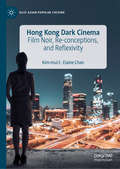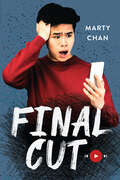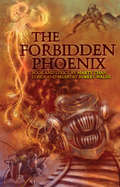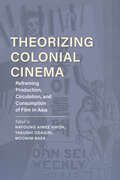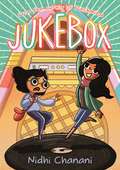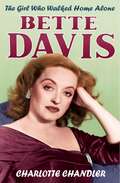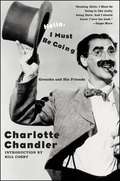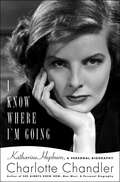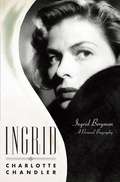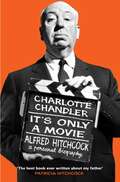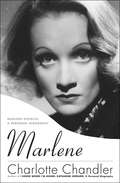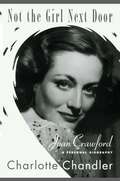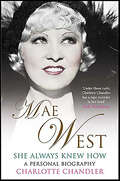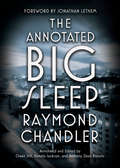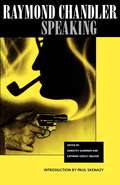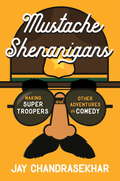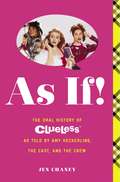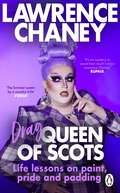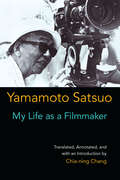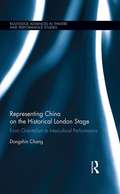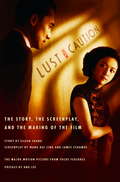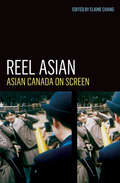- Table View
- List View
Hong Kong Dark Cinema: Film Noir, Re-conceptions, and Reflexivity (East Asian Popular Culture)
by Kim-Mui E. ChanThis book is a scholarly investigation of the historical development and contemporary transformation of film noir in today’s Hong Kong. Focusing on the evolvement of cinematic narratives, aesthetics, and techniques, the author balances a deep reading of the multiple filmic plots with a discussion of the cinematic portrayals of gender, romance, identities and power relations. Nuancing the prototypical cinematic form and tragic sense of classical film noir, the recent Hong Kong cinema turns around the classical generic role of film noir at the turn of the century to convey very different messages—joy, hope or love. This book examines how the mainstream cinema, or pre-and-post-Hong Kong cinema in particular, applies a peculiar strategy that makes rooms for the audience to enjoy a pleasure-giving process of reflexivity and also critique the mainstream ideology. With new analytical approaches and angles, this book breaks new ground in offering transcultural and cross-genre analyses on the cinema and its impact in local and international markets. This book is the first major scholarly investigation of the historical development and contemporary transformation of film noir in today’s Hong Kong. Focusing on the evolvement of cinematic narratives, aesthetics, and techniques, the author balances a deep reading of the multiple filmic plots with a refreshing discussion of the cinematic portrayals of gender, romance, identities and power relations. This book also revisits conceptual categories developed by Foucault, Lacan, Derrida and Butler.
Final Cut (Orca Anchor)
by Marty ChanMason has been picked on at school for as long as he can remember and he’s tired of it. He is happy that his family is moving and that he will never have to go to this school ever again. On his last day, Mason, a budding filmmaker, decides to get the ultimate revenge on the two worst bullies. He films them and then edits the footage to humiliate them. But then the plan takes on a life of its own. The video goes viral and the two bullies become the butt of everyone's jokes. Furious, they are determined to get even and Mason must run like his life depends on it. And it just might.
The Forbidden Phoenix
by Marty Chan Robert Walsh Derek MahSun Wukong's path, however, becomes a test of strength, agility, and character as he comes face to face with mysterious, enchanting, and heartless creatures. Inspired by the Chinese opera, The Forbidden Phoenix's lyricism brings us to a world where Chinese parables are woven with the painful history of the immigrant men who suffered greatly to build Canada's railroad in the 1800s. Playwright Marty Chan and composer Robert Walsh create a musical rife with stylized characters, lending itself to a performance brimming with acrobatics, slapstick, and martial arts.
Theorizing Colonial Cinema: Reframing Production, Circulation, and Consumption of Film in Asia (New Directions in National Cinemas)
by Nadine Chan Aaron Gerow Jane Marie Gaines Zhen Zhang Thomas A. Barker Nikki J. Lee José B. Capino Yiman WangTheorizing Colonial Cinema is a millennial retrospective on the entangled intimacy between film and colonialism from film's global inception to contemporary legacies in and of Asia. The volume engages new perspectives by asking how prior discussions on film form, theory, history, and ideology may be challenged by centering the colonial question rather than relegating it to the periphery. To that end, contributors begin by excavating little-known archives and perspectives from the colonies as a departure from a prevailing focus on Europe's imperial histories and archives about the colonies. The collection pinpoints various forms of devaluation and misrecognition both in and beyond the region that continue to relegate local voices to the margins. This pathbreaking study on global film history advances prior scholarship by bringing together an array of established and new interdisciplinary voices from film studies, Asian studies, and postcolonial studies to consider how the present is continually haunted by the colonial past.
Jukebox
by Nidhi ChananiGrab some coins for the jukebox, and get ready for a colorful, time-traveling, musical tale about family and courage.A mysterious jukebox, old vinyl records, and cryptic notes on music history, are Shaheen's only clues to her father's abrupt disappearance. She looks to her cousin, Tannaz, who seems just as perplexed, before they both turn to the jukebox which starts…glowing?Suddenly, the girls are pulled from their era and transported to another time! Keyed to the music on the record, the jukebox sends them through decade after decade of music history, from political marches, to landmark concerts. But can they find Shaheen’s dad before the music stops? This time-bending magical mystery tour invites readers to take the ride of their lives for a coming-of-age adventure.
The Girl Who Walked Home Alone: Bette Davis, A Personal Biography
by Charlotte ChandlerEven a short list of Bette Davis's most famous films -- Of Human Bondage; Jezebel; Dark Victory; The Private Lives of Elizabeth and Essex; Now, Voyager; All About Eve; What Ever Happened to Baby Jane? -- reveals instantly what a major force she was in Hollywood. Her distinctive voice, her remarkable eyes, her astonishing range and depth of characterization -- all these qualities combined to make Bette Davis one of the finest performers in film history. Drawing on extensive conversations with Bette Davis during the last decade of her life, Charlotte Chandler gives us a biography in which the great actress speaks for herself. (It was she who suggested that Chandler write this book.) Chandler also spoke with directors, actors, and others who knew and worked with Davis. As a result Davis comes to life in these pages -- a dynamic, forceful presence once again, just as she was on the screen. Though she owed everything to her mother, Ruthie, Bette Davis remained fascinated all her life by her hard-to-please father, who walked out on his family. She remembered the disappointment -- which never left -- over her father's lack of interest in her, and she believed that her resentment of him was probably a major factor in her four failed marriages: she kept putting her men in a position where they would eventually disappoint her. She spoke happily of her love affairs with Howard Hughes and William Wyler; she recalled her leading men, favorite co-stars, and unloved rivals; and she took great care to refute the persistent Hollywood legend that she was difficult to work with. Alone and ill, she faced her last days with bravery and dignity. The Girl Who Walked Home Alone is a brilliant portrait of an enduring icon from Hollywood's golden age and an unforgettable biography of the real woman behind the star.
Hello, I Must Be Going: Groucho and His Friends
by Charlotte ChandlerWhen Charlotte Chandler called Groucho Marx for an interview, he answered the phone himself. Declining to be interviewed, he invited her over to his house so he could tell her no in person. After talking with her for hours, Groucho asked, "Why aren't you writing?" Hello, I Must Be Going is the story of Groucho and the Marx Brothers, told through Groucho's everyday conversations with Charlotte Chandler and his friends. And what a group of friends they were! Woody Allen, Jack Nicholson, Elliott Gould, Bill Cosby, Marvin Hamlisch, Betty Comden, Adolph Green, Sidney Sheldon, and dozens of others walk through the pages of this fascinating book. Anyone interested in Groucho or the Marx Brothers, or who wants to spend a few hours in fabulous company, will find this book irresistible.
Hello, I Must Be Going
by Charlotte ChandlerWhen Charlotte Chandler called Groucho Marx for an interview, he answered the phone himself. Declining to be interviewed, he invited her over to his house so he could tell her no in person. After talking with her for hours, Groucho asked, "Why aren't you writing?" Hello, I Must Be Going is the story of Groucho and the Marx Brothers, told through Groucho's everyday conversations with Charlotte Chandler and his friends. And what a group of friends they were! Woody Allen, Jack Nicholson, Elliott Gould, Bill Cosby, Marvin Hamlisch, Betty Comden, Adolph Green, Sidney Sheldon, and dozens of others walk through the pages of this fascinating book. Anyone interested in Groucho or the Marx Brothers, or who wants to spend a few hours in fabulous company, will find this book irresistible.
Hello, I Must Be Going
by Charlotte ChandlerWhen Charlotte Chandler called Groucho Marx for an interview, he answered the phone himself. Declining to be interviewed, he invited her over to his house so he could tell her no in person. After talking with her for hours, Groucho asked, "Why aren't you writing?" Hello, I Must Be Going is the story of Groucho and the Marx Brothers, told through Groucho's everyday conversations with Charlotte Chandler and his friends. And what a group of friends they were! Woody Allen, Jack Nicholson, Elliott Gould, Bill Cosby, Marvin Hamlisch, Betty Comden, Adolph Green, Sidney Sheldon, and dozens of others walk through the pages of this fascinating book. Anyone interested in Groucho or the Marx Brothers, or who wants to spend a few hours in fabulous company, will find this book irresistible.
I Know Where I’m Going: Katharine Hepburn, a Personal Biography
by Charlotte ChandlerA revealing portrait of the famously private Katharine Hepburn, based on interviews Charlotte Chandler conducted with her in the 1970s and '80s.
Ingrid: Ingrid Bergman, a Personal Biography (Applause Bks.)
by Charlotte ChandlerIngrid Bergman was one of the biggest and most glamorous stars in Hollywood -- until she became one of the most controversial, when an international scandal threatened to end her career. She had starred in several now-classic films: Casablanca, Spellbound, Notorious, Gaslight, and her co-stars included such Hollywood icons as Humphrey Bogart, Cary Grant, and Gregory Peck. In this insightful new biography, Charlotte Chandler draws on her extensive conversations with Bergman herself to describe what happened from Bergman's point of view, revealing a complex and fascinating woman who lived life intensely. Already a movie star in her native Sweden, Ingrid Bergman became an instant sensation for David O. Selznick in Hollywood and the number-one box-office star in the world. But the most dramatic event in her life took place off the screen when she made a film in Italy and began a passionate romance with her director, Roberto Rossellini. The scandal that followed left her exiled from America, ostracized by Hollywood, vilified in the press, denounced by clergy, censured in the U. S. Senate -- and separated from her young daughter. She was able to make films only with Rossellini. In the words of those who were involved, Chandler describes Bergman's life before, during, and after the scandal. Among those Chandler spoke with were Alfred Hitchcock, George Cukor, Sidney Lumet, Cary Grant, Gregory Peck, Greta Garbo, and Liv Ullmann. She spoke with Roberto Rossellini; their twin daughters, Isabella and Isotta Ingrid; Rossellini's son, Renzo; Ingrid's daughter Pia Lindstrom; and others who knew Ingrid well. This extraordinary access makes Ingrid: Ingrid Bergman, a Personal Biography the most perceptive and revealing book ever written about the charismatic Hollywood legend.
It's Only a Movie: Alfred Hitchcock, a Personal Biography
by Charlotte ChandlerIn his films, Alfred Hitchcock found the perfect expression for his fantasies, and he shared those fantasies with the world in such classics asThe 39 Steps, The Lady Vanishes, Rebecca, Shadow of a Doubt, Notorious, Strangers on a Train, Rear Window, Long Synopsis: In his films, Alfred Hitchcock found the perfect expression for his fantasies, and he shared those fantasies with the world in such classics asThe 39 Steps, The Lady Vanishes, Rebecca, Shadow of a Doubt, Notorious, Strangers on a Train, Rear Window, The Man Who Knew Too Much, To Catch a Thief, North by Northwest, Vertigo, Psycho,andThe Birds. In It's Only a Movie, Charlotte Chandler draws from her extensive conversations with Hitchcock, frequently revealing unknown facts and unexpected insights into the man, the director, and his films. Author of acclaimed biographies of Groucho Marx, Federico Fellini, and Billy Wilder, Charlotte Chandler spent several years with Hitchcock discussing his life and his amazing career. She also talked with his wife, Alma, and daughter, Pat, as well as many of the screen legends who appeared in his films, including Cary Grant, Ingrid Bergman, James Stewart, Grace Kelly, Joan Fontaine, Laurence Olivier, Michael Redgrave, John Gielgud, Gregory Peck, Henry Fonda, Tippi Hedren, James Mason, Eva Marie Saint, Kim Novak, Anthony Perkins, Janet Leigh, and others. The result is an intimate yet expansive portrait of a unique artist who, from the 1920s through the 1970s, created many of history's most memorable films. A quarter-century after his death, Hitchcock's distinctive profile remains an instantly recognizable icon to millions, while his films continue to grow in popular appeal and critical esteem. Chandler introduces us to the real Hitchcock: a devoted family man, practical joker, and Englishman of Edwardian sensibilities who was one of the great masters of cinematic art.
Marlene: Marlene Dietrich, a Personal Biography
by Charlotte ChandlerIn Marlene, the legendary Hollywood icon is vividly brought to life, based on a series of conversations with the star herself and with others who knew her well. In the mid-1970s Charlotte Chandler spoke with Marlene Dietrich in Dietrich's Paris apartment. The star's career was all but over, but she agreed to meet because Chandler hadn't known Dietrich earlier, "when I was young and very beautiful." Dietrich may have been retired, but her appearance and her celebrity--her famous mystique--were as important to her as ever. Marlene Dietrich's life is one of the most fabulous in Hollywood history. She began her career in her native Berlin as a model, then a stage and screen actress during the silent era, becoming a star with the international success The Blue Angel. Then, under the watchful eye of the director of that film, her mentor Josef von Sternberg, she came to America and became one of the brightest stars in Hollywood. She made a series of acclaimed pictures--Morocco, Shanghai Express, Blonde Venus, Destry Rides Again, among many others--that propelled her to international stardom. With the outbreak of World War II, the fiercely anti-Nazi Dietrich became an American citizen and entertained Allied troops on the front lines. After the war she embarked on a new career as a stage performer, and with her young music director, the gifted Burt Bacharach--whom Chandler interviewed for the book--Dietrich had an outstanding second career. Dietrich spoke candidly with Chandler about her unconventional private life: although she never divorced her husband, Rudi Sieber, she had numerous well-publicized affairs with his knowledge (and he had a longtime mistress with her approval). By the late 1970s, plagued by accidents, Dietrich had become a virtual recluse in her Paris apartment, communicating with the outside world almost entirely by telephone Marlene Dietrich lived an extraordinary life, and Marlene relies extensively on the star's own words to reveal how intriguing and fascinating that life really was.
Not the Girl Next Door: Joan Crawford, a Personal Biography (Applause Bks.)
by Charlotte ChandlerIn this fascinating new biography of screen legend Joan Crawford, Charlotte Chandler draws on exclusive and remarkably candid interviews with Crawford herself and with others who knew her, including first husband Douglas Fairbanks, Jr., and Crawford's daughter Cathy. As a result, this biography is fresh and revealing, a brand-new look at one of Hollywood's most acclaimed stars. Joan Crawford was born Lucille LeSueur in San Antonio, Texas, in 1908 (as she always insisted, though other sources disagreed). Her father abandoned the family, and her mother soon remarried; Lucille was now known as Billie Cassin. Young Billie loved to dance and achieved her early success in silent films playing a dancer. Her breakthrough role came in Our Dancing Daughters. Soon married to Hollywood royalty, Douglas Fairbanks, Jr. (who called her "Billie"), she was a star in her own right, playing opposite John Barrymore and a stellar cast in M-G-M's Grand Hotel. Crawford was cast opposite another young star, Clark Gable, in several films. They would sometimes play lovers on screen -- and off as well. After her marriage to Fairbanks broke up, Crawford married actor Franchot Tone. That marriage soon began to show strains, and Crawford was sometimes seen riding with Spencer Tracy, who gave her a horse she named Secret. Crawford left M-G-M for Warners, and around the time she married her third husband, Phillip Terry, she won her Oscar for best actress (one of three times she was nominated) in Mildred Pierce. But by the 1950s the film roles dried up. Crawford and Terry had divorced, and Crawford married her fourth husband, Pepsi-Cola executive Alfred Steele. In 1962, she and longtime cinematic rival Bette Davis staged a brief comeback in the macabre but commercial What Ever Happened to Baby Jane? Following Steele's death, Crawford became a director of Pepsi- Cola while she continued raising her four adopted children. Although her daughter Christina would publish the scathing memoir Mommie Dearest after Crawford's death, Chandler offers a contrasting portrait of Crawford, drawing in part on reminiscences of younger daughter Cathy among others. Not the Girl Next Door is perhaps Charlotte Chandler's finest Hollywood biography yet, an intimate portrait of a great star who was beautiful, talented, glamorous, and surprisingly vulnerable.
She Always Knew How: Mae West, a Personal Biography
by Charlotte ChandlerIn She Always Knew How, her wonderful new biography of legendary actress Mae West, acclaimed biographer Charlotte Chandler draws on a series of interviews she conducted with the star just months before her death in 1980. From their first meeting, where West held out a diamond-covered hand in greeting and lamented her interviewer's lack of jewels, to their farewell, where the star was still gamely offering advice on how to attract men, Mae West and Charlotte Chandler developed a warm rapport that glows on every page of this biography. Actress, playwright, screenwriter, and iconic sex symbol Mae West was born in New York in 1893. She created a scandal -- and a sensation -- on Broadway with her play Sex in 1926. Convicted of obscenity, she was sentenced to ten days in prison. She went to jail a convict and emerged a star. Her next play, Diamond Lil, was a smash, and she would play the role of Diamond Lil in different variations for virtually her entire film career. In Hollywood she played opposite George Raft, Cary Grant (in one of his first starring roles), and W. C. Fields, among others. She was the number one box-office attraction during the 1930s and saved Paramount Studios from bankruptcy. Her films included some notorious one-liners -- which she wrote herself -- that have become part of Hollywood lore: from "too much of a good thing can be wonderful" to "When I'm good, I'm very good. When I'm bad, I'm better." Her risqué remarks got her banned from radio for a dozen years, but behind the clever quips was Mae's deep desire, decades before the word "feminism" was in the news, to see women treated equally with men. She saw through the double standard of the time that permitted men to do things that women would be ruined for doing. Her cause was sexual equality, and she was shrewd enough to know that it was perhaps the ultimate battleground, the most difficult cause of all. In addition to her extensive interviews of Mae West, Chandler also spoke with actors and directors who worked with and knew the star, the man with whom she lived for the last twenty-seven years of her life, as well as her closest assistant at the end of her life. Their comments and insights enrich this fascinating book. She Always Knew How captures the voice and spirit of this unique actress as no other biography ever has.
The Annotated Big Sleep
by Raymond ChandlerThe first fully annotated edition of Raymond Chandler&’s 1939 classic The Big Sleep features hundreds of illuminating notes and images alongside the full text of the novel and is an essential addition to any crime fiction fan&’s library. A masterpiece of noir, Raymond Chandler's The Big Sleep helped to define a genre. Today it remains one of the most celebrated and stylish novels of the twentieth century. This comprehensive, annotated edition offers a fascinating look behind the scenes of the novel, bringing the gritty and seductive world of Chandler's iconic private eye Philip Marlowe to life. The Annotated Big Sleep solidifies the novel&’s position as one of the great works of American fiction and will surprise and enthrall Chandler&’s biggest fans. Including: -Personal letters and source texts -The historical context of Chandler&’s Los Angeles, including maps and images -Film stills and art from the early pulps -An analysis of class, gender, sexuality, and ethnicity in the novel
Raymond Chandler Speaking
by Raymond ChandlerTough-minded and typically idiosyncratic, here is Chandler on Chandler, the mystery novel, writing, Hollywood, TV, publishing, cats, and famous crimes. This skillfully edited selection of letters, articles, and notes also includes the short story "A Couple of Writers" and the first chapters of Chandler's last Philip Marlowe novel, The Poodle Springs Story, left unfinished at his death. Paul Skenazy has provided a new introduction for this edition as well as a new selected bibliography.
Mustache Shenanigans: Making Super Troopers and Other Adventures in Comedy
by Jay ChandrasekharDirector, writer, and actor Jay Chandrasekhar tells the hilarious history of his comedy group, Broken Lizard, and the making of the cult film Super Troopers, as well as the currently filming Super Troopers 2.Jay Chandrasekhar has spent the past two decades writing, directing, and acting in film and TV. With his comedy group, Broken Lizard, he has produced and directed beloved movies such as Super Troopers, Beerfest, and Club Dread. Now, with the upcoming release of the long-awaited Super Troopers 2, Jay is ready to tell the ridiculous, madcap, dead-honest story of how he built his career, how he formed Broken Lizard, and, ultimately, how he made Super Troopers. Jay grew up Indian American in the lily-white suburbs of Chicago, and he had an outsider’s perspective from the beginning. Instead of taking the traditional acting path, he formed his own troupe, wrote his own scripts, and made movies his own way. And he had an incredibly good time doing so as readers will learn in this hilarious story about making it in Hollywood and directing, cowriting, and costarring in one of the best-loved and most-watched comedies of all time. Part humorous memoir, part film study, this book will inform, entertain, and tell readers what drinking multiple bottles of maple syrup is really like.
As If!
by Jen ChaneyAcclaimed pop culture journalist Jen Chaney shares an oral history of the cult classic film Clueless in the ultimate written resource about one of the most influential, revered, and enduring movies of the 1990s--in celebration of its twentieth anniversary.Will we ever get tired of watching Cher navigate Beverly Hills high school and discover true love in the movie Clueless? As if! Written by Amy Heckerling and starring Alicia Silverstone, Clueless is an enduring comedy classic that remains one of the most streamed movies on Netflix, Amazon, and iTunes even twenty years after its release. Inspired by Jane Austen's Emma, Clueless is an everlasting pop culture staple. In the first book of its kind, Jen Chaney has compiled an oral history of the making of this iconic film using recollections and insights collected from key cast and crew members involved in the making of this endlessly quotable, ahead-of-its-time production. Get a behind-the-scenes look at how Emma influenced Heckerling to write the script, how the stars were cast into each of their roles, what was involved in creating the costumes, sets, and soundtrack, and much more. This wonderful twentieth anniversary commemoration includes never-before-seen photos, original call sheets, casting notes, and production diary extracts. With supplemental critical insights by the author and other notable movie experts about why Clueless continues to impact pop culture, As If! will leave fans new and old totally buggin' as they understand why this beloved film is timeless.
(Drag) Queen of Scots: The hilarious and heartwarming memoir from the UK’s favourite drag queen
by Lawrence Chaney'It's no mystery or secret how much I enjoy Lawrence Chaney.' - RuPaul'Tackles everything from gender identity, the thrill of a wig and why Scottish talent is often overlooked.' - i NewsLawrence Chaney has wowed audiences across the globe as the winner of RuPaul's Drag Race UK. In Lawrence (Drag) Queen of Scots, Lawrence shares heartfelt and candid moments from their past. From being bullied as a child to what it's like to date as a drag queen, they give us an insight to their journey towards acceptance and better mental health.The loch ness legend themself takes us through the struggles faced to get to where they are now. From their childhood, growing up as a queer kid in Glasgow, feeling self-conscious and turning to humour to avoid being bullied, Lawrence shares their painfully relatable coming out story, and how finding drag was a vehicle towards confidence and self-love.__________'Gorgeous, hugely talented, funny, charismatic, adorable, Chaney is a goddess and brings us joy.' - Lorraine'Lawrence shares some of [their] most intricate and personal stories...such as concocting a drag name, mental health and dating.' - Gay Times'Lawrence Chaney is the funniest queen by a country mile. She has delivered the laughs a locked down nation needed in abundance. But there's much more to Chaney than her quick wit. Her vulnerability is also part of her natural gift.' - Vogue
My Life as a Filmmaker
by Chia-Ning Chang Satsuo YamamotoIn his posthumous autobiography, Watakushi no eiga jinsei (1984), Yamamoto reflects on his career and legacy: beginning in the prewar days as an assistant director in a well-established film company under the master Naruse Mikio, to his wide-ranging experiences as a filmmaker, including his participation in the tumultuous Toho Labor Upheaval soon after Japan’s defeat in World War II and his struggles as an independent filmmaker in the 1950s and 1960s before returning to work within the mainstream industry. In the process, he established himself as one of the most prominent and socially engaged film artists in postwar Japan. Imbued with vibrant social realism and astute political commentary, his filmic genres ranged widely from melodramas, period films from the Tokugawa era, samurai action jidaigeki, social satires, and antiwar films. Providing serious insights into and trenchant critique of the moral corruption in Japanese politics, academe, industry, and society, Yamamoto at the same time produced highly successful films that offered drama and entertainment for Japanese and international moviegoers. His considerable artistic distinction, strong social and political consciousness, and filmic versatility have earned him a unique and distinguished position among Japan’s world-class film directors. In addition to detailed annotations of the autobiography, translator Chia-ning Chang offers a comprehensive introduction to the career and the significance of Yamamoto and his works in the context of Japanese film history. It contextualizes Yamamoto’s life and works in the historical and cultural zeitgeist of prewar, wartime, and postwar Japan before scrutinizing the unique qualities of his narrative voice and social conscience as a film artist.
Representing China on the Historical London Stage: From Orientalism to Intercultural Performance (Routledge Advances in Theatre & Performance Studies)
by Dongshin ChangThis book provides a critical study of how China was represented on the historical London stage in selected examples from the late seventeenth century to the early twentieth century—which corresponds with the Qing Dynasty (1644-1911), China’s last monarchy. The examples show that during this historical period, the stage representations of the country were influenced in turn by Jesuit writings on China, Britain’s expanding material interest in China, the presence of British imperial power in Asia, and the establishment of diasporic Chinese communities abroad. While finding that many of these works may be read as gendered and feminized, Chang emphasizes that the Jesuits’ depiction of China as a country of high culture and in perennial conflict with the Tartars gradually lost prominence in dramatic imaginations to depictions of China’s material and visual attractions. Central to the book’s argument is that the stage representations of China were inherently intercultural and open to new influences, manifested by the evolving combinations of Chinese and English (British) traits. Through the dramatization of the Chinese Other, the representations questioned, satirized, and put in sharp relief the ontological and epistemological bases of the English (British) Self.
Lust, Caution
by Eileen Chang Wang Hui LingNow a major motion picture from Oscar-winning director Ang Lee (Crouching Tiger, Hidden Dragon, Brokeback Mountain): an intensely passionate story of love and espionage, set in Shanghai during World War II.In the midst of the Japanese occupation of China and Hong Kong, two lives become intertwined: Wong Chia Chi, a young student active in the resistance, and Mr. Yee, a powerful political figure who works for the Japanese occupational government. As these two move deftly between Shanghai's tea parties and secret interrogations, they become embroiled in the complicated politics of wartime -- and in a mutual attraction that may be more than what they expected. Written in lush, lavish prose, and with the tension of a political thriller, Lust, Caution brings 1940s Shanghai artfully to life even as it limns the erotic pulse of a doomed love affair.From the Trade Paperback edition.
Reel Asian: Asian Canada on Screen
by Elaine ChangFounded in 1997 by producer Anita Lee and journalist Andrew Sun, the Toronto Reel Asian International Film Festival is a unique showcase of contemporary Asian cinema and work from the Asian diaspora. The festival fosters the exchange of cultural and artistic ideals between East and West, provides a public forum for homegrown Asian media artists and their work and fuels the growing appreciation for Asian cinema in Canada.In Reel Asian: Asian Canada on Screen, contributors, many of them filmmakers, examine East and Southeast Asian Canadian contributions to independent film and video. This collection highlights the screen as a site for the reflection, projection and reimagination of identities and communities, and explores the idea that Asian Canada is less a demographic category than it is a term of art. Distinguished film- and video-makers, artists and cultural critics address a wide array of topics, genres, regional concerns and historical contexts in provocative, original essays and one-on-one conversations. The first anthology of its kind, the volume also includes a substantial selection of images and stills, and a resources section providing detailed artist and distribution information.
Team Piano Repertoire: A Manual of Music for Multiple Players at One or More Pianos
by Frederic Ming Chang Albert FaurotListing of classical musical pieces written for 2 or more piano players
